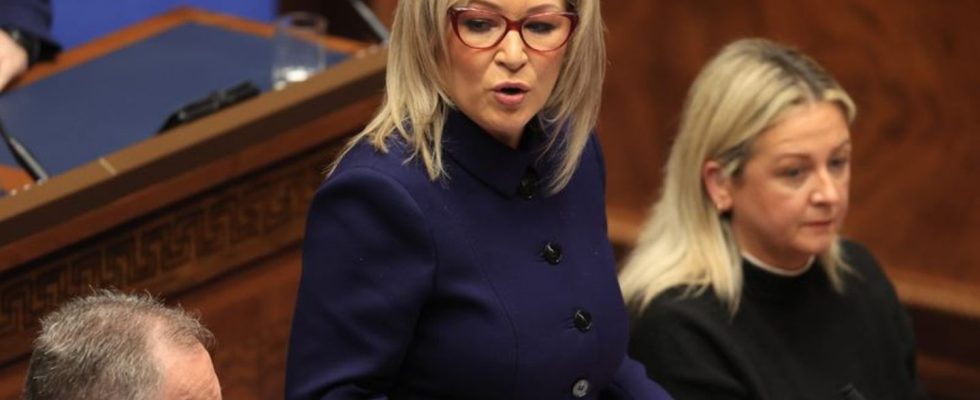Government
First Catholic to head Northern Ireland
Michelle O’Neill is the new head of government of Northern Ireland. photo
© Liam Mcburney/PA Wire/dpa
Northern Ireland was founded expressly as a stronghold for pro-British Protestants. But demographics are changing – with political consequences.
In the decades-long civil war, Catholics seeking union with Ireland fought against Protestants advocating political union with Great Britain. Thousands were killed. The Good Friday Agreement ended the conflict in 1998. It prescribes a unity government between the two denominational camps.
A head of government for everyone
In her first speech, which she gave partly in Irish, O’Neill emphasized that she wanted to be a head of government for everyone. It must govern together with the DUP, which advocates political union with Great Britain. The most important party in the Protestant camp is entitled to the equal position of deputy head of government in the finely balanced political system. Emma Little-Pengelly, a confidante of party leader Jeffrey Donaldson, was nominated for this. “Despite our different views on the future constitutional state, the public rightly demands that we work together, deliver and work together,” O’Neill said.
In an interview with the British TV channel Sky News, however, she made it clear that she did not share the position of the British government, which sees a referendum on the unification issue as still decades away. The 47-year-old said her election shows that the situation on the Irish island is changing. O’Neill has deep roots in the Republican camp. Her father Brendan Doris was an activist in the terrorist organization IRA and was therefore in prison. Sinn Fein was long considered the political arm of the IRA.
Political crisis ends
With O’Neill taking office, the political crisis in Northern Ireland ended two years to the day after the previous government collapsed. Sinn Fein received the most votes for the first time in the following regional election in May 2022. However, the Democratic Unionist Party (DUP) refused to cooperate. She ultimately called for an end to all customs controls between Northern Ireland and the rest of the United Kingdom, which the British central government and the EU had agreed on after Brexit.
Just a few days ago, the DUP agreed to a new document after negotiations with London. Internal British controls should be reduced to a minimum. But experts call this agreement symbolic. The Belfast Telegraph newspaper commented that the DUP had missed its target and was selling its defeat as a victory.
Is Irish unity getting closer?
O’Neill’s election is seen as a historic breakthrough for Irish nationalism. Sinn Fein leader Mary Lou McDonald said a united Ireland was “within reach”. The party is also ahead in polls in the Republic of Ireland. There, however, two liberal-conservative parties in a coalition are preventing participation in the government.
There has been great skepticism on the Northern Irish side so far. The Irish Times newspaper found at the end of 2023 that only 30 percent would be in favor of unification in a referendum, but 51 percent would be against it. Many fear financial consequences from a merger. In the Republic of Ireland, however, approval is almost two thirds. In principle, the Irish leadership is also striving for a merger. “I believe there will be a united Ireland in my lifetime,” Prime Minister Leo Varadkar said in September.
For the first time there are more Catholics than Protestants in Northern Ireland
The demographics favor Republicans. For the first time, there are more Catholics living in Northern Ireland than Protestants, a 2021 census has shown. The area was founded in 1921 after the Irish Civil War expressly as a home for those who wanted to continue to be part of Great Britain – and the majority were Protestants. The Unionists, who see themselves as British, are now insisting on their positions all the more intensely, experts say.
The aim of the previous regulation between Great Britain and the EU was to avoid a “hard border” between Northern Ireland and Ireland after Brexit in order not to stir up new conflicts. But the implementation sometimes led to shortages of food or medicine. Pets could no longer be taken on holiday to the UK. Loyalists feared that the controls would endanger the Union.
The British and Irish governments and almost all parties in Northern Ireland welcomed the DUP’s return to unity government. But hardcore unionists criticized the fact that Northern Ireland continues to be dependent on the laws of the EU, whose internal market the region is de facto part of even after Brexit. They also criticize the “enthronement” of O’Neill. “We have a Sinn Fein head of government, but not in my name or that of thousands of other unionists,” said Traditional Unionist Voice party leader Jim Allister.

